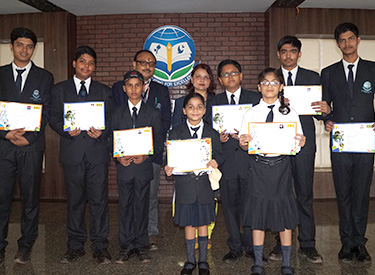Academic World School, the best CBSE School in Chhattisgarh knows how to make students’ overall personalities shine in the future.
The world around each child is infinitely curious about who they are, what they do, and their origins. Posing questions is the first step toward filling knowledge gaps and resolving dilemmas for students. They use it to direct their learning to make sense of new material and prior knowledge.
When people ask questions, they can share their current understanding of a subject, connect their knowledge with other ideas, and identify their strengths and weaknesses.
Student questions play an important role in meaningful learning and motivation. They provide insight into the quality of their thinking and conceptual understanding, their alternative frameworks, their understanding, and what they want to know. These days, every CBSE school in Chhattisgarh encourages its students to ask questions during lessons. It can give teachers a better understanding of the needs of their students. It is possible to recall notes from the past and find doubts if you ask questions. Questioning by students, particularly at the higher cognitive level, is also essential to problem-solving. In addition, to elicit thoughtful and productive answers, it is important to first come up with good questions. A low level of questions and explanations on the part of the students correlates with low achievement.
It is impossible to wake up one day and attempt a marathon without training. In the same way, good questions require practice, training, and mentorship. If children (or adults) are not encouraged to ask questions, they will not become active questioners. In addition to helping students learn, student questioning can also help teachers work better. Researchers have examined how student questions can influence the curriculum. In some questions, students have been thinking about the ideas presented and attempting to draw connections between them and topics they already know. Questions can also expose much about the quality of learners thinking and conceptual understanding, attitudes, and confusion about various concepts, their reasoning, and the type of information they seek.
Questioning is an ancient intellectual practice that draws its purpose from ancient philosophies. The Greek philosopher Socrates used questions to examine the validity of assumptions, analyze arguments, and explore the unknown.
CBSE Schools in Chhattisgarh today advocate using Socratic questions as an effective teaching method. When students have the power to ask questions, they will be more likely to understand and speak about the subject matter. Questioning is considered a foundation skill, and understanding the core of a topic with the help of the right questions helps strengthen it. The right questions can get students thinking critically and independently and help them diagnose any misunderstandings. When you start implementing it in your school, you will quickly see the difference in student engagement and your ability to keep lessons engaging and productive.
It is helpful to ask questions as it will allow you to understand what is happening better. Consequently, failing to ask questions results in poor decision-making. The lack of knowledge causes students to feel low about themselves. It encourages independent learning to know when your classmates are switching topics because they understood the Questioning.
Despite the educational significance of student questioning, students rarely ask genuine questions. The majority of students do not ask high-level or open questions spontaneously.

The fear of judgment is the main reason why children stop asking questions. The Academic World School, one of the best CBSE schools in Chhattisgarh, shares a few tips for encouraging children to ask questions.
- Children should feel comfortable asking questions in a safe environment. Your answer to their question should not be judged or ridiculed.
- If you want them to ask questions, do not provide examples immediately. Allow them to struggle a bit to find the right words. The learning process involves all of this.
- Assist them with statements to paraphrase into questions. You can polish your questioning and grammar skills by paraphrasing.
- Ensure that students are not limited to a certain number of questions.
- Praising the child for asking the question should precede you are answering the question. Children respond well to encouraging statements such as ‘thank you for asking that question’ or ‘It’s a great question.’
- Only a few students can submit questions anonymously if the teacher asks for anonymous submission. In this way, the fear of judgment is completely gone.

Educating an adult to facilitate informed decision-making and lifelong learning is the sole purpose of education. To be future-ready, a child should have the ability to ask questions and find answers. There are currently numerous studies looking for ways to help students generate questions. And educators weigh in on this issue on a growing basis. Researchers at different levels of education and in various contexts report that learners avoid asking questions.
The number and kind of questions that learners ask may depend on –
- Previous knowledge
- Experiences
- Skills
- Their age
- The attitude of the teacher
- Teaching style
- Classroom evaluative climate
- Topic of discussion
In general, students ask questions when there is a gap between their knowledge and their desire to learn more. There may be a cognitive disequilibrium when students ask questions prompted by unfamiliar words or a lack of consistency between prior knowledge and new knowledge.
Our motto at AWS – The best CBSE School in Chhattisgarh is ‘the best thing you can do to bring about change is to ask questions.’
Find out more about the school and the admission process by contacting us at:
Phone: +91-9111-299-900, +91-9111-399-900
Email us at: academicworldschool@gmail.com